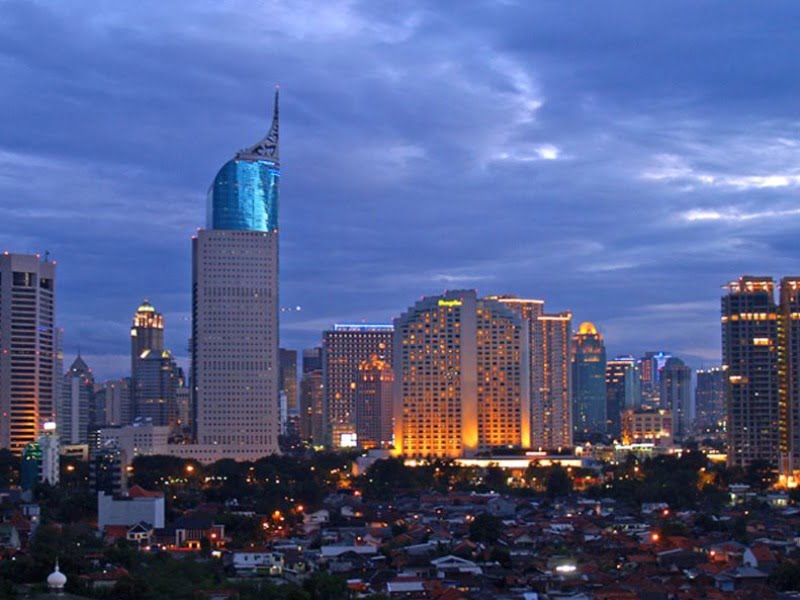Indonesia’s planned new capital will be a technology hub based on Silicon Valley, says Indonesian President Joko Widodo. He says the new city will have world-class universities and hospitals and a green transportation system with only electric vehicles.
President Widodo has told the Jakarta Post the new capital will be a ‘smart metropolis’ and designed to be a melting pot of technological innovations that can sustain the country for the next century and beyond.
“The new capital will boast cutting-edge technology and online applications to improve the delivery of public services,” he said.

The new city is to be built in East Kalimantan province on the island of Borneo, almost in the geographical centre of Indonesia. It does not yet have a name, nor an exact location. But it is more than a pipedream – an announcement has been made and planning has begun.
The government says construction will start in 2021 and agencies will start moving from Jakarta by 2024.
Kalimantan is largely free of natural disasters, with no cyclones or volcanoes or earthquakes, and with no problems from rising sea levels. But it is home to one of Indonesia’s largest man-made ecological problems, rampant and illegal deforestation, much of it to clear land for palm oil plantations.
Nearly half of the world’s second largest rainforest after the Amazon has been destroyed. Local wildlife, including the famous orangutan and the proboscus monkey, is under threat. Smoke from fires illegally lit to clear the jungle periodically blot out the sun in Malaysia and Singapore.
Massive investment in the new capital should provide many opportunities for Australian companies, says Phil Turtle, president of the Australia Indonesia Business Council.
“Everybody internationally will want a piece of such an exciting and large-scale development,” he told InnovationAsia. “There will be plenty to go around, but Australian companies will need to rise to the challenge and proactively seek to get involved.
“Jokowi’s emphasis on technology provides significant opportunities for Australia,” he says, using the president’s widely used nickname. “The recently signed trade agreement with Indonesia is very strong in technological cooperation, particularly cyber security.”
He is referring to the Indonesia-Australia Comprehensive Economic Partnership Agreement, signed in March but not yet ratified by either country’s Parliament, but expected to be in force during Q1 2020.
Mr Turtle believes one of the biggest opportunities for Australian companies is in IT training.
“There are many new technology companies, and the country has a very young demographic. They all seem to carry two or three mobile phones and virtually everything is app-based. Australian companies need to get on board.”
The move to a new capital is designed to take some pressure off Jakarta, which is now one of the world’s largest cities and has major man-made ecological problems of its own. It is crowded and polluted and is sinking into its marshy ground. It has probably the world’s worst traffic. President Widodo also says a major reason for the move is to help spread Indonesia’s wealth beyond the island of Java, which dominates Indonesia financially, culturally and demographically.
By population Indonesia is now the fourth largest country on earth, after China, India and the USA. It has more than 270 million people, with 145 million of them on Java and 30 million in greater Jakarta.
A decades long policy of ‘transmigrasi’ has had only a minor effect in getting people off Java to the outer islands. The government is attempting to ethnically engineer its troubled province of West Papua so the Javanese outnumber the native Melanesians.
The country is also physically massive, over 5000 km east to west. Its largest island Sumatra alone is more than 1500 km long. Many Australians do not realise just how big the country is, nor how quickly its economy is growing. And a glance at the map shows its geopolitical importance, to Australia and to the region.
The cost of the new capital is estimated at around US$33 billion, less than 10 per cent of planned infrastructure expenditure in Indonesia over the next five years. The country is booming. It is already in the top ten economies globally on a Purchasing Price Parity basis and in the top twenty in absolute terms. The country can afford the move.
Indonesians could be justified for displaying a certain degree of cynicism over President Widodo’s description of the new capital as a ‘smart city’. There has been no shortage of announcements about Indonesia’s technological future in the last few years.
In 2015 Minister of Communications and IT Rudiantara announced an investment of US$1 billion in Indonesian startups, and in 2016 when Jokowi himself launched an enterprise called the ‘Thousand Startups Movement’ intended to launch that many new tech businesses by 2020.
It has not happened. Only have 500 have been counted to date, but the program has now been expanded geographically and rebranded as ‘1001 Startups’.
There are many challenges standing in the way of Indonesia’s plans to become a Southeast Asian technology hub. There are constraints on foreign investment, there are skills shortages, and the financial system is comparatively immature.
Despite Indonesians massive growth, technology investment is dwarfed by that in India and China, and even that in nearby Malaysia and tiny Singapore. Everybody wants to be a technology leader. India and China are massive and with significant head starts, and Malaysia and Singapore are much more advanced economies where English is the language of business.
But Indonesia’s numbers are impressive and it is one of the world’s biggest users of mobile technology. Things are moving quickly. The massive investment that it will be making its new capital city can only improve things. Australia needs to take notice.
Do you know more? Contact James Riley via Email.
